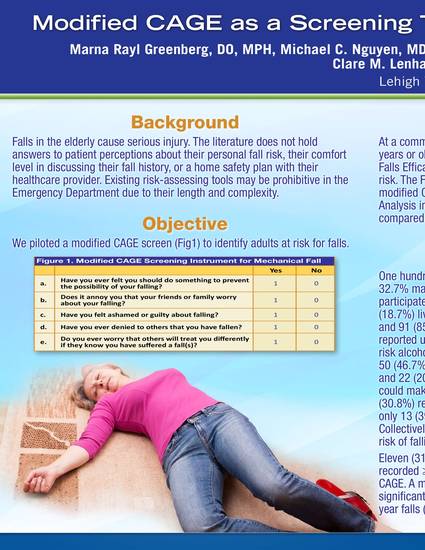
Modified CAGE as a Screening Tool for Mechanical Fall Risk Assessment: A Pilot Survey
Marna Rayl Greenberg DO, MPH, Michael C Nguyen MD, Bernadette G Porter BA,Robert DBarraco, MD MPH, Brian Stello MD, Arnold Goldberg MD, Clare M Lenhart, PhD MPH,Anita Kurt PhD, RN, Bryan G Kane, MD
Background: Falls in the elderly cause serious injury. The literature does not hold answers to patient perceptions about their personal fall risk, their comfort level in discussing their fall history, or a home safety plan with their healthcare provider. Existing risk-assessing tools may be prohibitive in the Emergency Department due to their length and complexity.
Objective: We piloted a modified CAGE screen (Fig1) to identify adults at risk for falls.
Methods: At a community health event, a convenience sample ofparticipants (50 years or older) was surveyed. The survey included demographics, the Falls Efficacy Scale (FES), the modified CAGEand questions about fall risk.The FES is a validated, but longer, survey metric for comparison. A modified CAGE score greater than or equal to 1 was considered positive. Analysis included descriptive statistics and modified CAGE groups were compared by gender, fall risk and history with chi-square.
Results: One hundred sevensubjects (66.4%female, 32.7% male) with a mean age of 66 (SD7.9)participated; 98 (91.6%)were Caucasian. Twenty (18.7%) lived alone,43 (40.2%) had a cat or dog, and 91 (85%) had stairs at home. Six (5.6%) reported using assistive devices, 2 (1.9%) at-risk alcohol use; 9 (8.4%)taking blood thinners, 50 (46.7%) taking blood pressure medications, and 22 (20.6%) one or more medications that could make them drowsy. Thirty-threesubjects(30.8%) reported having fallen in the past year; only13 (39.4% of those fallen)sought treatment. Collectively, these variables resulted in a mean risk of falling score of 2.49 (SD=1.36) out of 9.
Eleven (31.4%)femalesand27 (38.0%)malesrecorded ≥1 positive responses on the modified CAGE.A modified CAGE positive responsewas significantly greater among those with past-year falls (51.5%) than those without (29.7%), p=0.031.A positive modified CAGE screen was also associated with a higher mean FES score (10.82 v7.83, p
More females than males reported past year falls (36.6% vs. 17.1%, p=0.04) yet no difference in fall risk was noted between genders (4.44 vs. 4.26, p=0.506). The proportion of modified CAGE positive participants did not vary between females and males (38% vs. 31%, p=0.505).
Of those whoscreened positive on the modified CAGE, 36 (92.3%) reported comfort in speaking to their healthcare provider about their fall risk and 26 (66.7%) in having a home safety evaluation.
Conclusions: In this pilot, a positive modified CAGE is associated with both higher FES scores and a willingness to discuss fall risk with a health care provider. The modifiedCAGE may be a usefulbrief screening tool to detect fall risk in adults. Further studies to determine the extent of its utility in an Emergency Department should be considered.
Greenberg, M., Nguyen, M., Porter, B., Barraco, R., Stello, B., Goldberg, A., Lenhart, C., Kurt, A., & Kane, B. (2013, October 14-17). Modified CAGE as a Screening Tool for Mechanical Fall Risk Assessment: A Pilot Survey. Poster presented at: The 2013 American College of Emergency Physicians Scientific Assembly, Seattle, WA.
Greenberg, M., Nguyen, M., Porter, B., Barraco, R., Stello, B., Goldberg, A., Lenhart, C., Kurt, A., & Kane, B. (2013, October 14-17). Modified CAGE as a Screening Tool for Mechanical Fall Risk Assessment: A Pilot Survey. Poster presented at: The PaACEP Scientific Assembly, Harrisburg, PA. (April 7-9, 2014)
